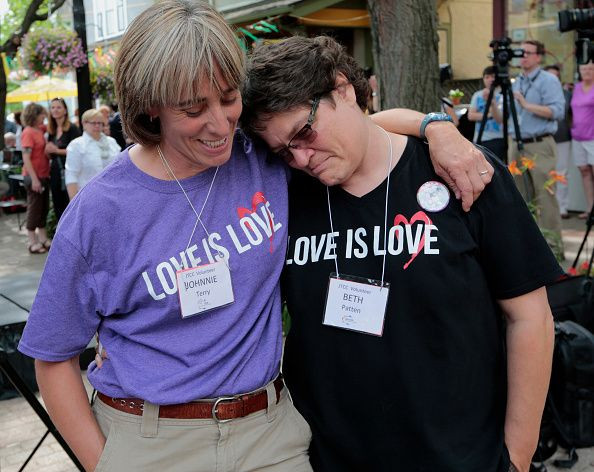Supreme Court Gay Marriage Ruling Excites Most, But Conservative States Aren't Celebrating

Kyle Gomez wore a traditional white wedding dress to get married in 2013, but this time, she's wearing jeans. Gomez, 29, didn't want to stop to change on Friday as she left work early and headed to the courthouse to apply for a formal Michigan marriage license with her partner of eight years. She already feels married to Sara, with whom she shares a house, two cats and a dog named Beckett; but soon it will be official. Once they get the certificate, they plan to have a ceremony at home -- one smaller than their 2013 wedding but different in another, more important way: This time, their union will be legal.
My partner & I can finally get the recognition we have wanted so badly. Tears of joy #gaymarriage #Michigan #Equality pic.twitter.com/fbs99rsny5
- Ky Gomez (@jugodejalapeno) March 21, 2014The Supreme Court's landmark decision Friday that states were required to marry same-sex couples under the 14th Amendment was praised by many. However, the municipal response in the 13 states where where gay marriage had been banned wasn't so universal. Responses varied, with some clerks issuing marriage licenses to same-sex couples immediately, while others refused or postponed implementing the ruling.
Social media was flooded with photos of happy couples crying, embracing and posing with marriage certificates as lesbian, gay, bisexual and transgender rights advocates across the country released statements of victory.
Photo of the first same-sex marriage today in Dallas Texas, where I reside. This is a real thing happening. Amazing. pic.twitter.com/TogeDOzv6y
— Rob DenBleyker (@RobDenBleyker) June 26, 2015First couple gettting married RIGHT NOW in Cleveland, OH. Keith Garrett & Chris Richardson. Congrats! pic.twitter.com/VhXLdpFWKg
— Scott Taylor (@ScottTaylor19) June 26, 2015However, in Texas, Attorney General Ken Paxton told clerks and justices of the peace to not approve any same-sex marriage licenses until he'd given further instructions. In a statement, he added that the decision was "a dilution of marriage as a societal institution."
Louisiana Attorney General Buddy Caldwell said his staff hadn't found anything in the ruling saying the decision went into effect ASAP, so they were waiting for a final directive before issuing licenses. "This Supreme Court decision overturns the will of the people of Louisiana, and it takes away a right that should have been left to the states," he said in a statement. Caldwell continued, "The Attorney General's Office will be watching for the Court to issue a mandate or order making today's decision final and effective and will issue a statement when that occurs."
In East Baton Rouge Parish, the state's biggest, clerks were waiting for the 25-day rehearing period to expire, said public information officer Fred Sliman. They'd received a few calls from people wondering about the Supreme Court decision, but their legal counsel advised them to wait before complying.
Same-sex marriage ruling handed down by SCOTUS. Michael Robinson and Earl Benjamin are the first in line in #nola pic.twitter.com/pjC2v6k6jl
— Chris Granger (@chris_granger) June 26, 2015Judy Gibson and Barb DiBernard -- first couple to marry in Lancaster County, Nebraska. @KETV #MarriageEquaility pic.twitter.com/EQ7t4UeC48
— Alex Hoffman (@hoffman_alex) June 26, 2015Franklin County has been ready for the decision for months. The office modified its forms to be gender-neutral, swapping terms like "bride" and "groom" for "applicant 1" and "applicant 2." On the license itself, the titles "Mr." and "Mrs." were changed so people could fill in whatever they wanted after the letter "M" -- "you can go Mr. and Mr. or Ms. and Ms.," Benroth added.
The paperwork wasn't updated at the Hamilton County clerk's office in Tennessee. The application still said "husband" and "wife," and scratching out the terms would invalidate the document, said assistant manager Cindy Brown. They hadn't prepared for the Supreme Court decision because they weren't sure how it would rule. "No one could speculate really which way it would go," Brown said.
.@louisvillemayor popping bottles with the first same-sex married couple in #Louisville. Per @ByRobertoR: pic.twitter.com/81p29jJvrm
— Phillip M. Bailey (@phillipmbailey) June 26, 2015Hamilton County hadn't seen any applicants yet, but Meade County, Kentucky, married its first same-sex couple shortly after noon. Clerk of Court Judy Jordan said she got a text alert from a local TV station when the ruling was announced Friday and began issuing licenses soon after. New forms changing "bride" and "groom" to "party 1" and "party 2" should be available by Tuesday.
Gomez and her wife plan to be married by that point. This weekend is Gomez's 30th birthday, so all of her friends already are in town to celebrate. If everything goes as planned at the courthouse, the party will be extra special.
"I hope that we can do this and no one's going to try to pull the rug out from underneath us," she said. "Today the fact that I can legally marry someone that I love is mind-blowing because I did not know when that would happen."
© Copyright IBTimes 2025. All rights reserved.






















